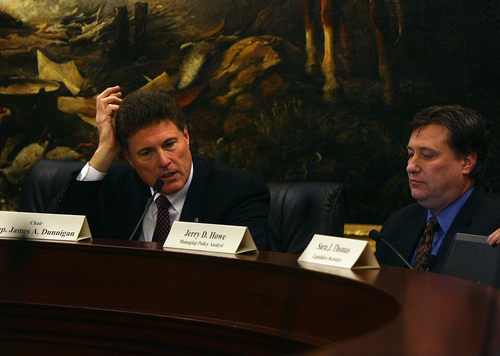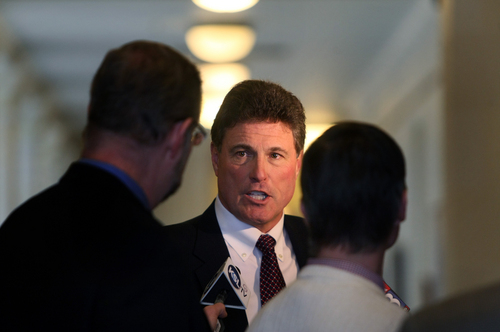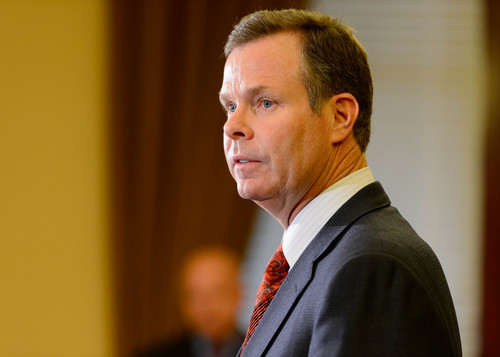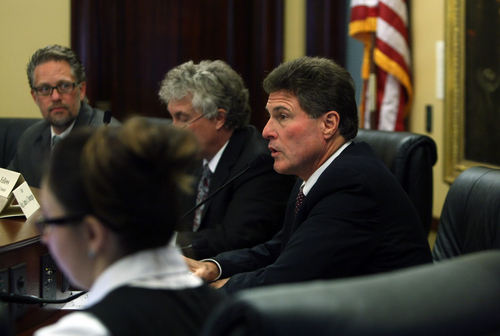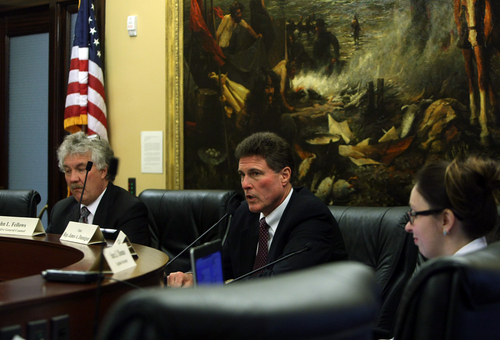This is an archived article that was published on sltrib.com in 2013, and information in the article may be outdated. It is provided only for personal research purposes and may not be reprinted.
The Utah House committee investigating former Attorney General John Swallow plans to have public meetings over two days to present the findings of the four-month probe that has now cost $2.3 million.
"I don't want to spend any more taxpayer money than necessary in this case, but we were given a mandate," said Rep. Lee Perry, R-Perry, a member of the bipartisan panel, which met Saturday to discuss the endgame to its fact-finding mission.
The report is needed, Perry added, "so the public gets to know how their money was spent and gets to know what we've come to learn and we'll still be learning in the near future."
One of the things the committee has learned, said Rep. Jim Dunnigan, R-Taylorsville, is that another device containing Swallow's electronic data mysteriously disappeared.
Dunnigan, who heads the panel, said the committee found out about the latest device two days ago. Swallow's data from his state-issued laptop and desktop computers were transferred to an external hard drive in November 2012. That hard drive, Dunnigan added, was apparently left on an airplane and not recovered.
That brings to seven the number of data devices that have vanished, crashed or had data erased. They are Swallow's state-issued laptop and desktop computers, his home computer, a handheld device, a cellphone, an iPad and now the hard drive. In addition, investigators believe an unknown number of emails and calendar entries were also lost.
Steven Reich — the committee's special counsel and a member of the defense team during then-President Bill Clinton's impeachment — has described the scope of the data loss in the Swallow matter as unlike anything he has ever seen.
Attempts to recover the missing information, along with litigation trying to enforce the committee's subpoenas, will end up costing taxpayers easily $1 million of the overall tab, Dunnigan said. Computer forensic experts were unable to recover any information from Swallow's state-issued computers. Dunnigan wouldn't comment on whether they retrieved information from Swallow's home computer.
Investigators for the special House committee were told to stand down after Swallow announced his resignation Nov. 21. The first-year Republican attorney general's exit, which took effect Tuesday, made any impeachment effort moot, leaving the House with no other possible action to take.
However, Dunnigan said the House committee has worked closely with other investigations. That includes a criminal probe by two county prosecutors, in conjunction with the FBI and state investigators, into the actions of Swallow, his GOP predecessor, Mark Shurtleff, and others.
Salt Lake County District Attorney Sim Gill, a Democrat, and Davis County Attorney Troy Rawlings, a Republican, already have a separate report from the lieutenant governor's office that alleges Swallow committed five election-law violations.
"People delete emails all the time. That in itself is not problematic," Gill said previously. "However, if the deleted emails pertain to ongoing investigations and if those emails were deleted knowing such investigations were afoot, then it would raise the specter of concern, specifically obstruction of justice."
Attorneys for the House committee withdrew nine subpoenas last week — seven of them to Swallow's former campaign consultant Jason Powers and Powers' various political-action committees and fundraising organizations; the other two to Swallow's former employers, Softwise and Tosh Inc.
At the same time, it issued two new subpoenas to the attorney general's office and the Utah Department of Financial Institutions for records relating to the processing of online-poker payments at the now-defunct SunFirst Bank in St. George.
Indicted St. George businessman Jeremy Johnson and his Las Vegas partner, Chad Elie, began processing player payments for online poker companies in late 2009 at SunFirst. In 2010, Johnson approached Shurtleff and Swallow, then chief deputy attorney general, to try to convince them that such payment processing was legal — even though the Justice Department had been prosecuting such activities for years.
The House special counsel and the investigative team will present their findings in public meetings over two days on Dec. 19-20. They then will prepare a written report, plus any recommendations on changes to state law that could help avoid future scandals like the yearlong one that eventually drove Swallow from office.
"I'm very cognizant of the money that has been spent. I do think it's worth it," Dunnigan said. "I think it's very important for the House of Representatives and the state of Utah to hear what we have learned."
That report is not expected for several more weeks.
Investigators will have the latitude to tie up loose ends before the presentation and, if the committee decides further action is warranted, could do additional follow-up.
"I think, given the time we've spent on this matter, the effort we've tried to put forth on behalf of our constituents, that this is a laudable" course of action, said Rep. Rebecca Chavez-Houck, D-Salt Lake City. "I know that we, as a committee, are still committed to our task, and it's important we follow the leads that have been presented … by our team."
The committee met for nearly four hours Saturday in a closed-door meeting with legislative attorneys, discussing the investigative and legal strategy along with the path ahead.
Swallow has proclaimed his innocence throughout the ordeal, which erupted within days of his January inauguration.
gehrke@sltrib.comTwitter: @RobertGehrke —
Two-day public meeting
The House special counsel and the investigative team will present their findings in the John Swallow probe on Dec. 19-20 at the Utah Capitol.


